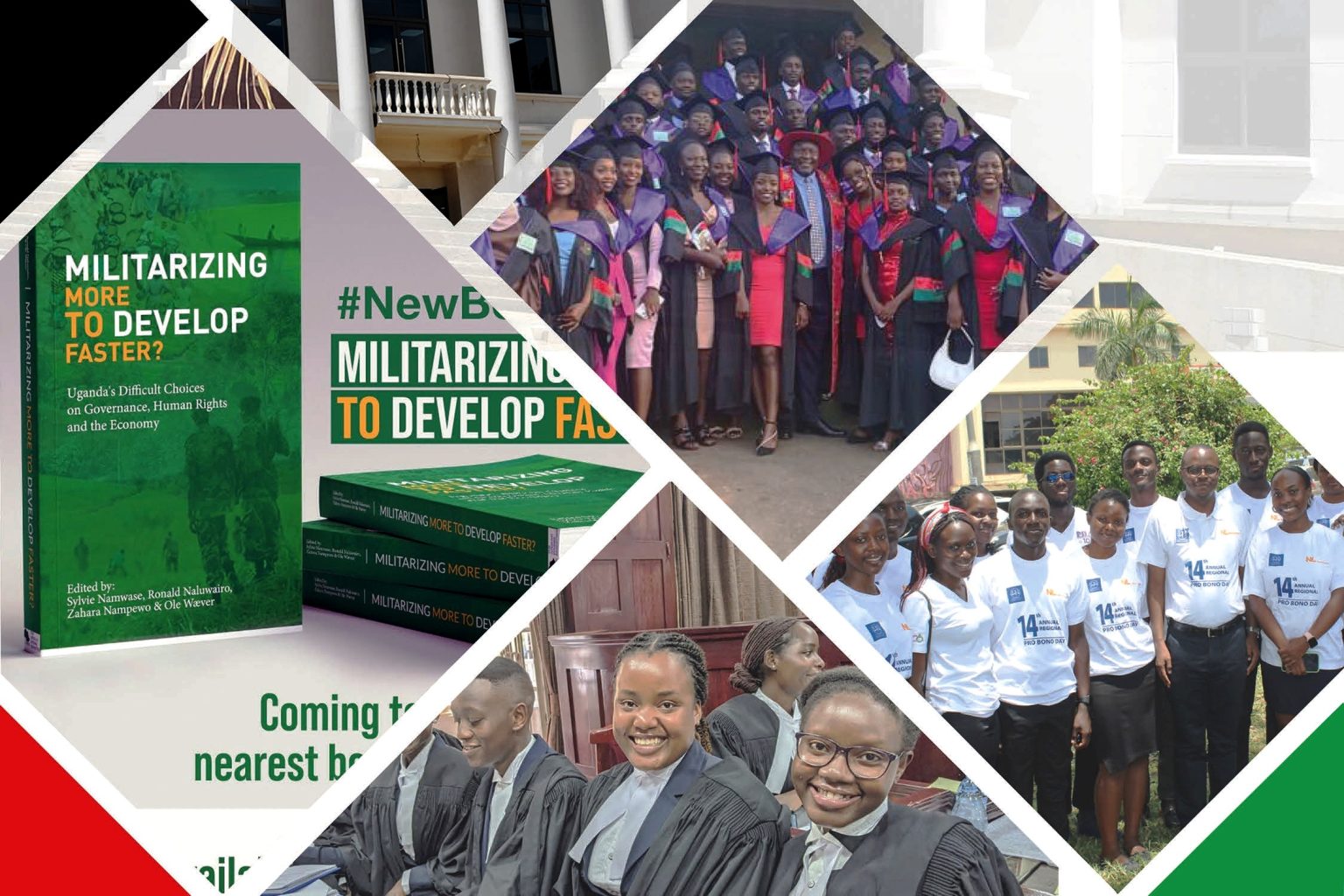- webadmin
- November 2, 2023
- Uncategorized
HURIPEC Talks
#HURIPECTalks: A PODCAST BY HURIPEC
To listen: huripec.mak.ac.ug/huripectalks
#HURIPECTalks is a podcast hosted by HURIPEC. It explores various issues shaping Uganda today and offers a platform where academics at the School of Law and beyond can share their research and reflections on a multitude of topics. The main objective of the podcast is to broaden avenues for dialogue, knowledge production and knowledge exchange with a view towards solving some of the most pertinent challenges facing Uganda, Africa and the world. The podcast is anchored in analyses on human rights, sustainable development, conflict resolution, gender equality, constitutional law, social justice, among others.
This first HURIPECTalks podcast series on law, militarisation, peace and development defines militarism and militarisation and explores how these phenomena have manifested throughout Uganda’s history and present. It examines how militarism and militarisation are impacting rule of law, policy and politics as well as the economy and society, and how they are shaping gender relations, youth expressions and aspirations. The series also unpacks theories of Pan Africanism and decolonisation in relation to militarisation and militarism, and how they influence peace in Uganda and in the broader African context. The different episodes in this series suggest ways in which Uganda can balance the role of the military in operations other than war, such as development and security roles, while preserving democratic agendas and aspirations towards inclusivity, balanced civil military relations and sustainable peace in Uganda
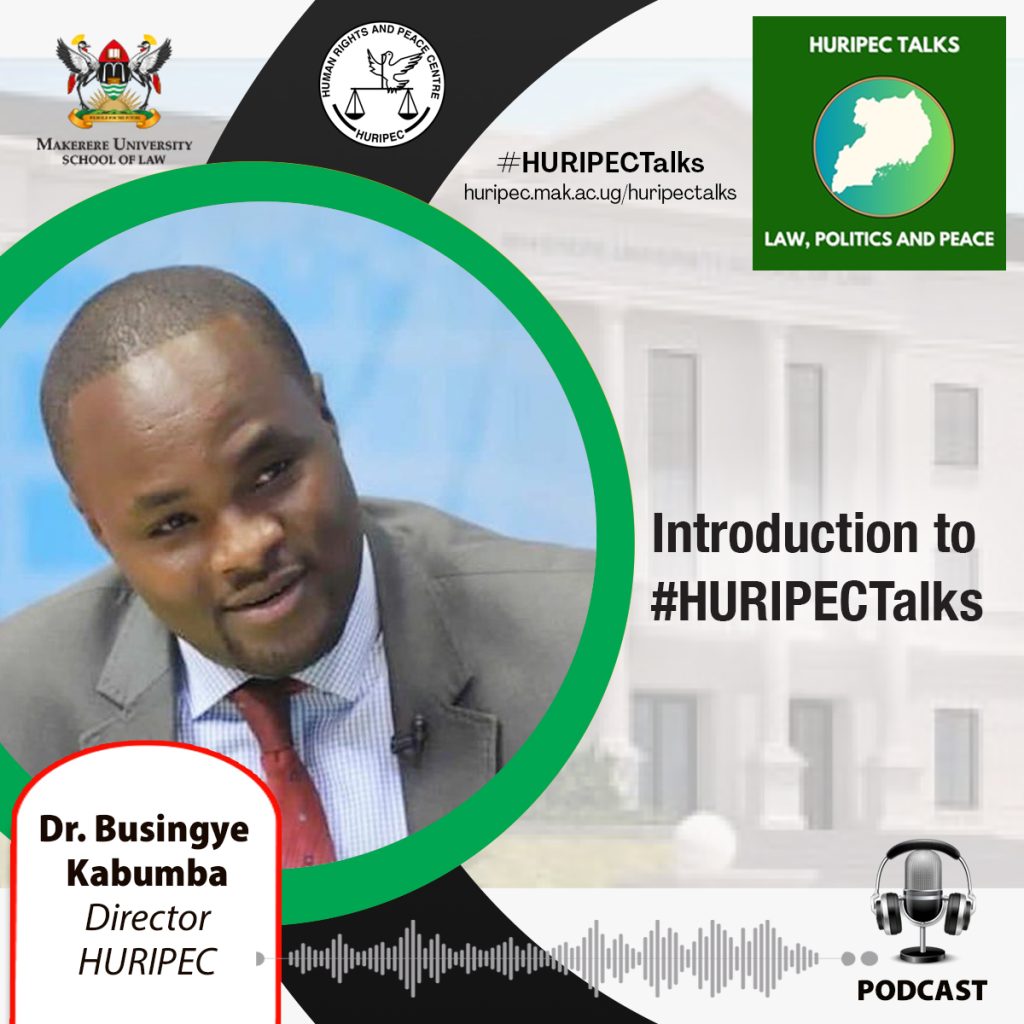
HURIPEC Talks Podcast Series: Episodes
Introduction
This is an introduction to the podcast series: HURIPECTALKS. It is made by the Director of HURIPEC and in it, he briefly describes HURIPEC’s history and mandate and how HURIPECTALKS serves as one of many platforms for the institution’s academic research, dissemination and advocacy mandate.
DNA testing: In the case of militarisation of Uganda, who is the father?
The return of coups d’états in West Africa, has once again pushed militarism to the forefront of Africa’s politics, and here in Uganda, the discourse around the role of armies in the country’s social, political and economic landscape is gaining momentum. But as you discover in this episode, militarism is not new to our collective memory as a country. To start off this series, we ask ourselves where this phenomenon of militarism and militarisation came from and how it has come to define who we are as Ugandans.
It leaves this question unanswered to set an open dialogue for the rest of the series and for broader reflection by listeners.

This episode explores the following key areas: the History of militarisation in Uganda; the conceptual scope of militarism and militarisation; contemporary manifestations of militarisation in Uganda; and a contextual understanding of militarisation in Uganda. It asks a critical question whether Uganda is a country with a military or a military with a country.
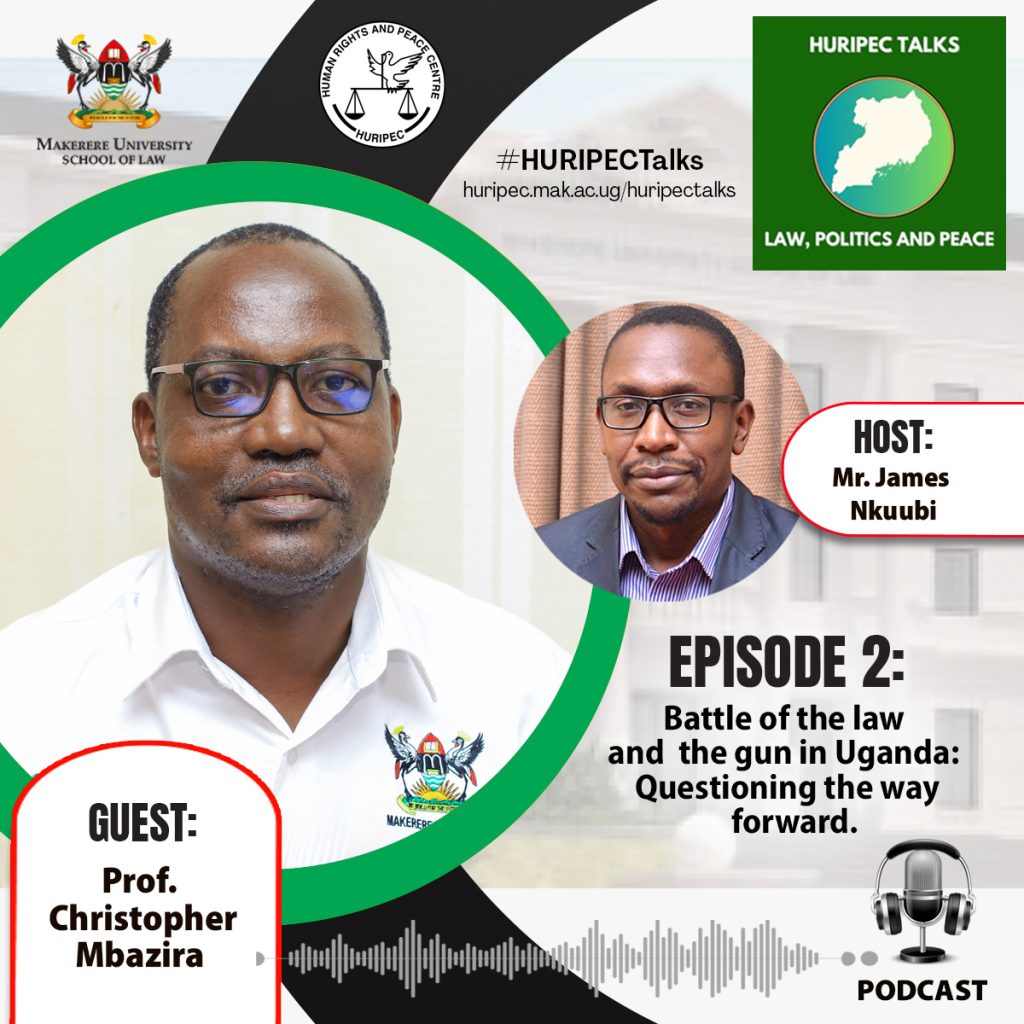
Ultimately, the episode examines the relationship between the supremacy of the military versus the supremacy of the 1995 Constitution of the Republic of Uganda.
Battle of the law and the gun in Uganda: questioning the way forward
This episode unpacks the tensions between law and militarisation in Uganda. It explores the impact of military deployment in Uganda’s development sectors in the absence of functional institutional and civilian oversight. It also examines the phenomenon of “orders from above” and the impact this has on governance.
Re-imagining Uganda’s future in the era of militarisation.
This episode explores how militarization and militarism are impacting citizens’ agency and accountability of state institutions in Uganda. The episode examines how these phenomena affect the various formations of citizens’ civic expression in Uganda, such as youth, ethnic nationalities, media, civil service, and many others.
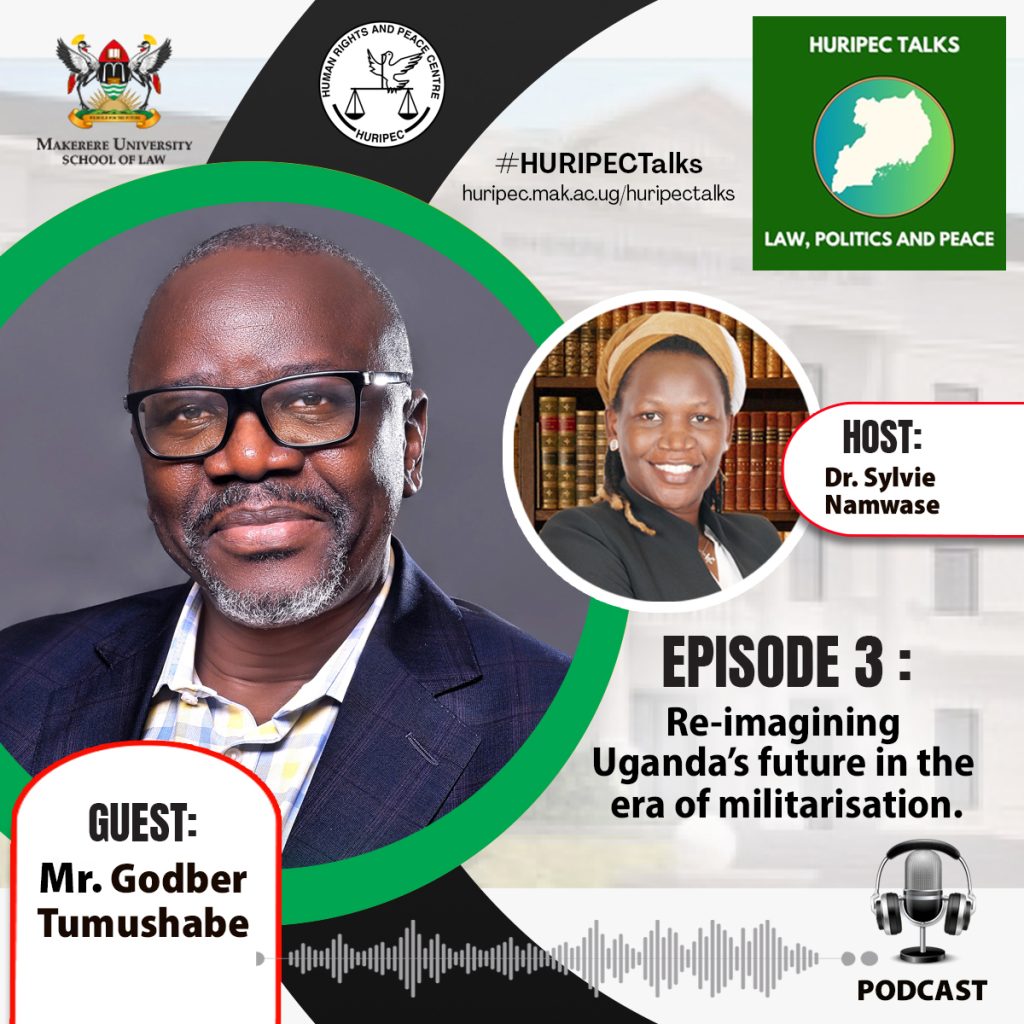
It also considers the question whether beyond militarisation the army has a role to play in civic spaces.
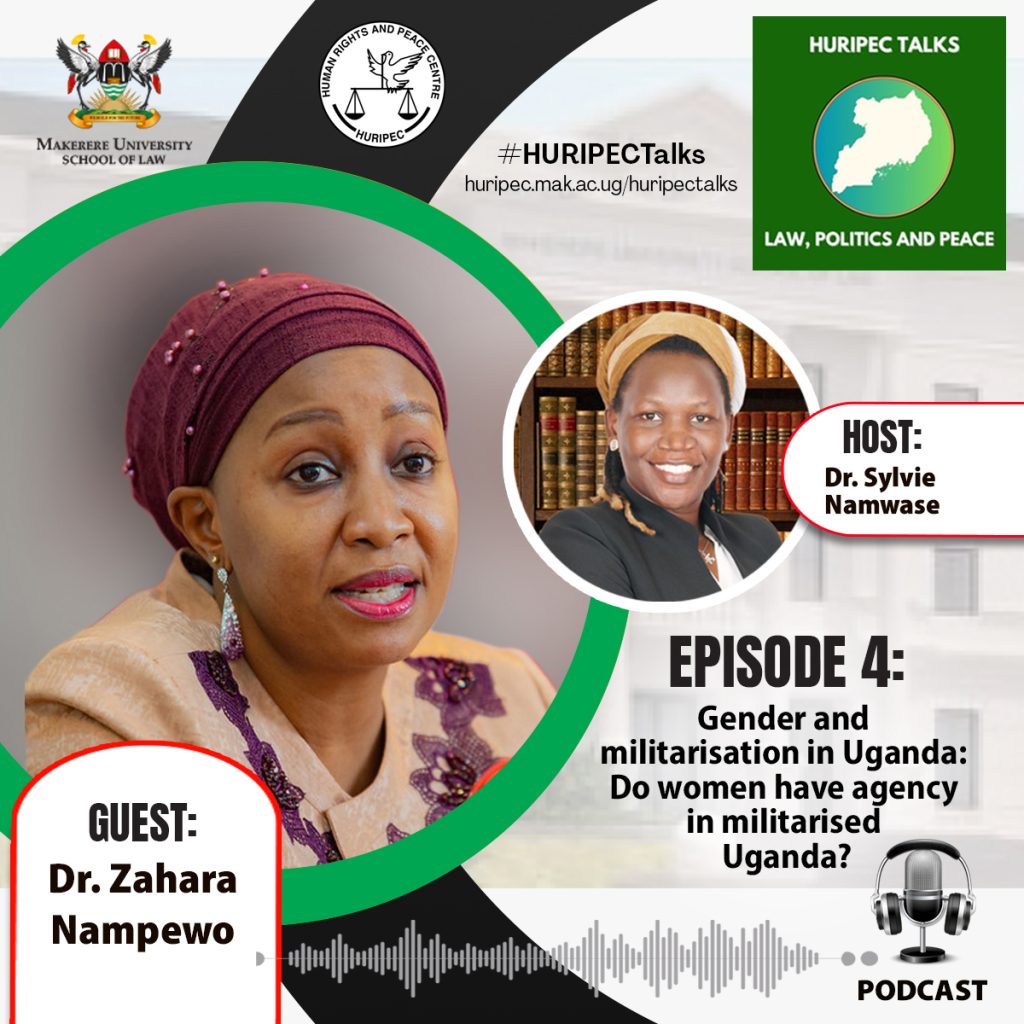
The episode also explores how militarism and militarisation affect masculinities in Uganda.
Gender and militarisation in Uganda: Do women have agency in militarised Uganda?
This episode examines how militarization and militarism impact gender dynamics in Uganda. It explores the roles women played in Uganda’s military and political history and interrogates whether these roles have translated into benefits for Ugandan women in today’s socio-economic and political context.
Military development Model? From combatants to Industrialists
This episode examines the role of the military in the industrialization process underway in Uganda. It takes a specific focus on the National Enterprise Corporation (NEC) which is the commercial arm of the Ministry of Defence and the Uganda Peoples’ Defence Forces (UPDF).
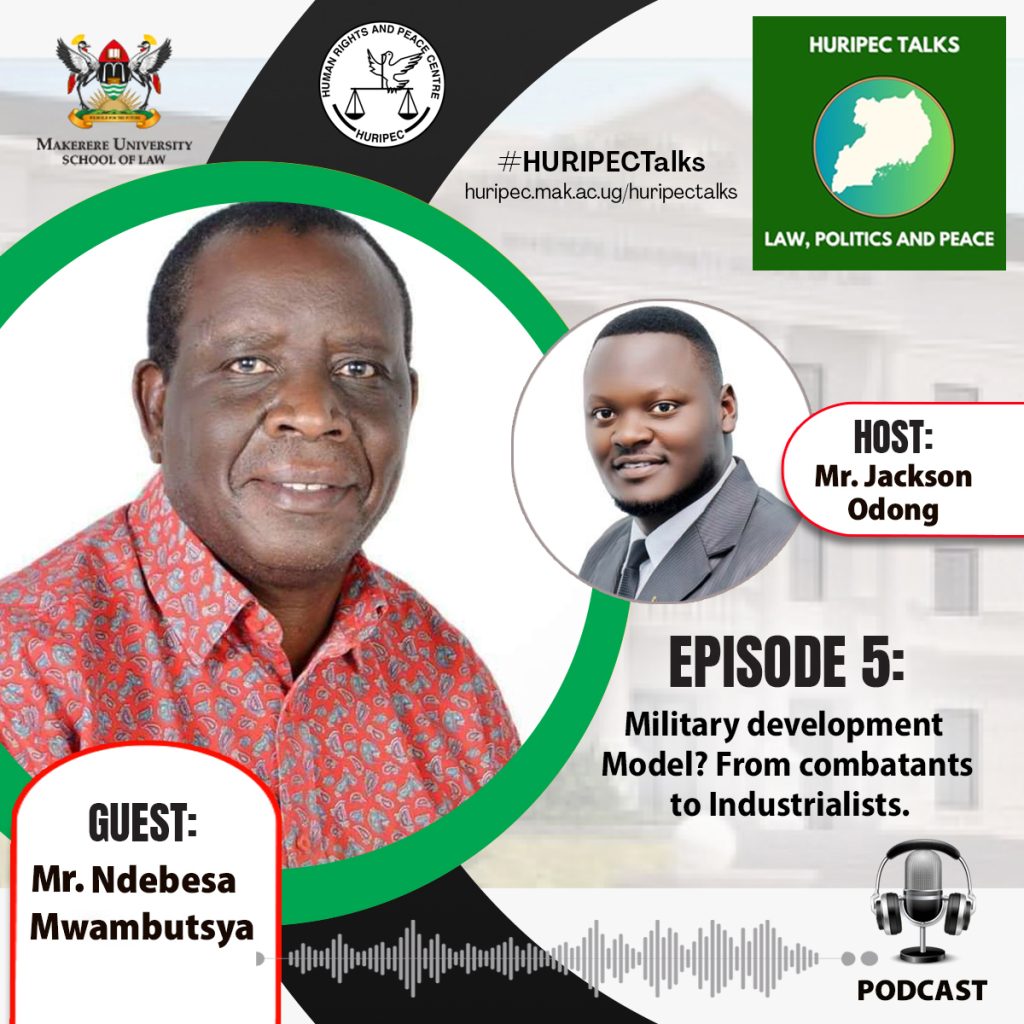
It also explores the role of the UPDF in natural resource protection with respect to forestry, fisheries, minerals and wild life resources.
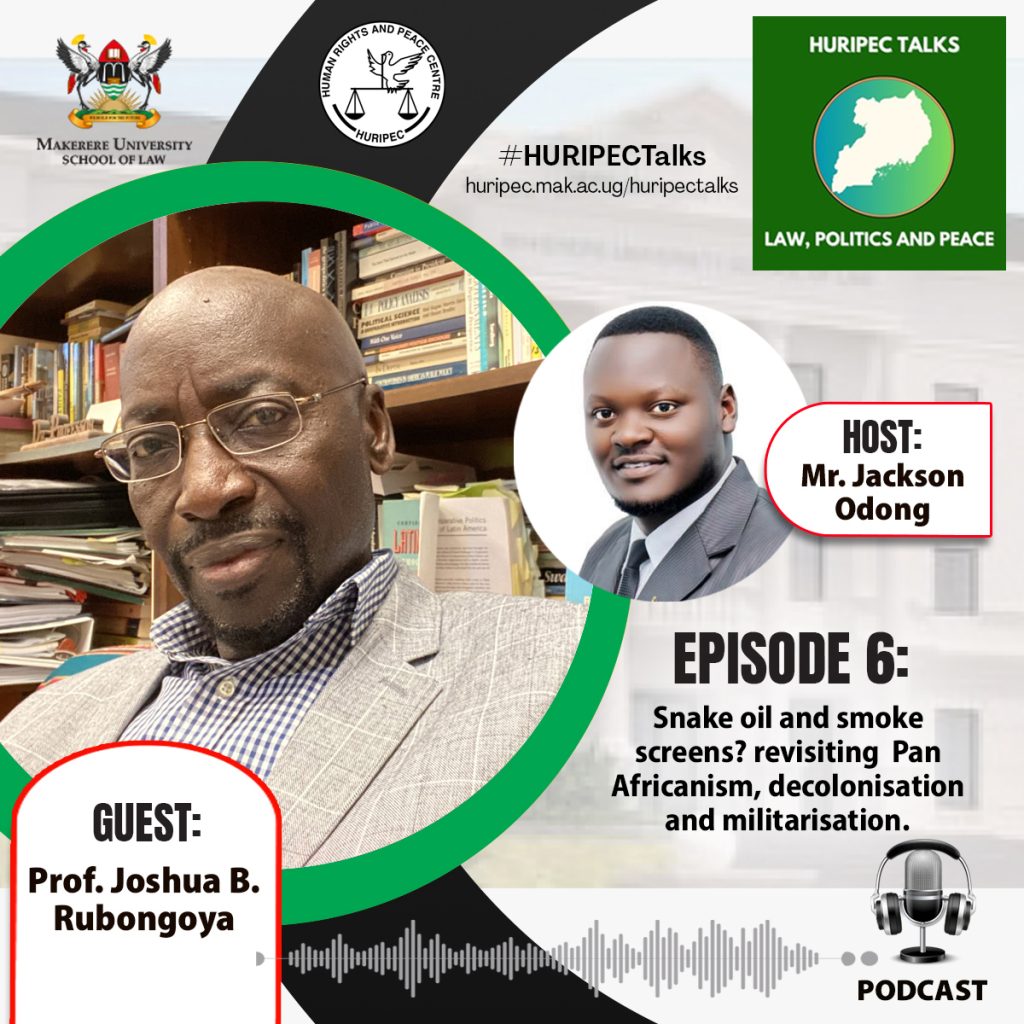
It also explores the role of global actors such as the United Nations, the European Union and the African Union and regional blocs such as the East African Community.
Snake oil and smoke screens? revisiting Pan Africanism, decolonisation and militarisation
This episode explores Pan Africanism, decolonisation and militarisation in Uganda with a focus on the political economy of regional militarisation. The episode discusses the role of the Uganda People’s Defence Forces (UPDF) in Africa with regard to peacekeeping and stabilisation missions.
Is Uganda in a cycle of militarisation?
This concluding episode reflects on the entire series and analyses the political, social and economic landscape in the country to ask the critical question whether Uganda is repeating its history of militarism which led it down a path of political, social and economic turmoil. It explores aspects of citizen’s resistance, compromise and/or co-optation to militarisation. It probes what type of citizen has emerged in Uganda over the course of a history marked by militarisation.
About the Guests
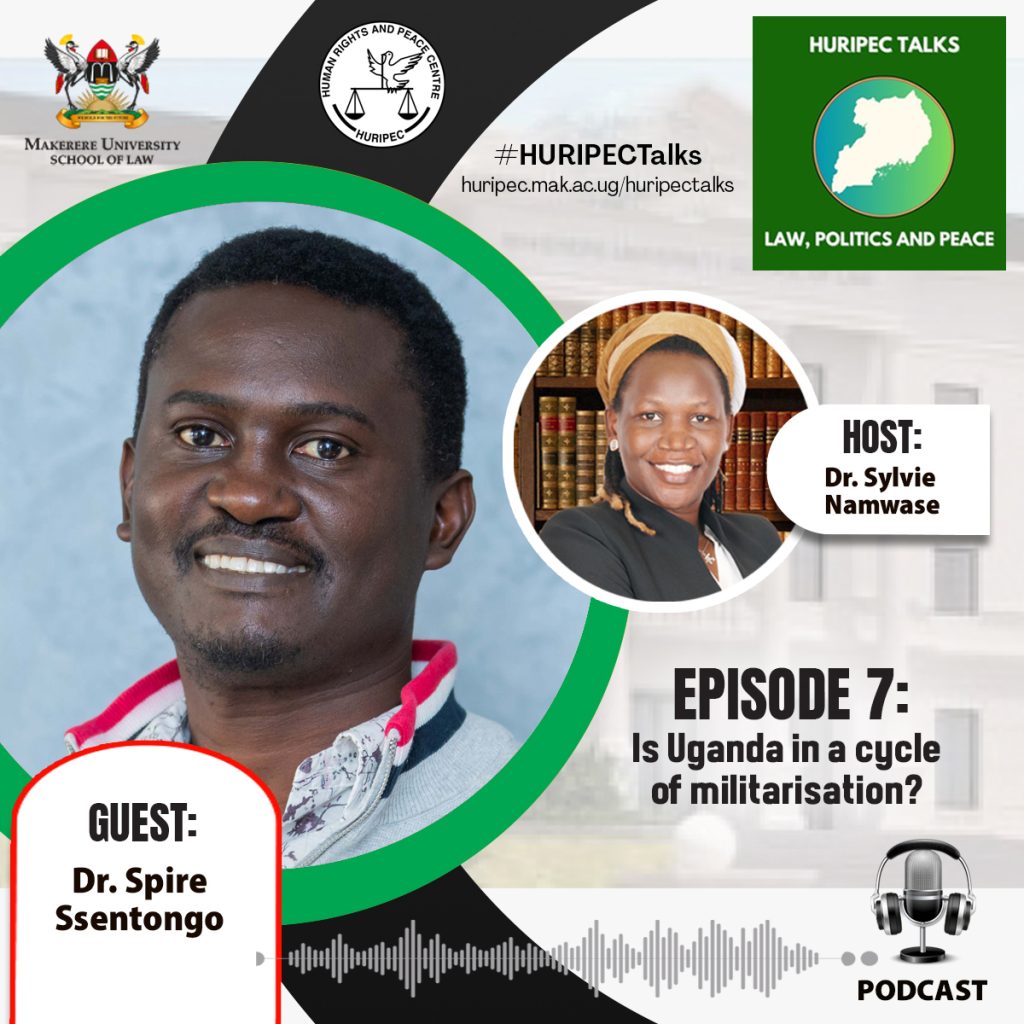
It concludes with reflections on how Uganda might ensure peace even in the context of militarisation.
Mr. James Nkuubi, practices Constitutional and human rights law and democratization in Africa through teaching, research, writing and strategic activism with particular focus on security sector reform, citizenry resilience and liberative politics in Africa. James also lends a great deal of his professional acumen and time to human rights initiatives and campaigns across Uganda. He has previously chaired the Civil and Political Rights Working Group under the Network for Public Interest Lawyers, based at the School of Law, Makerere University-using public interest litigation to counter, mitigate and combat social injustice, human rights and constitutional law transgressions by the State. James holds a Masters’ Degree in human rights and democratization in Africa from the Centre for Human Rights, University of Pretoria and currently an LLD student focusing on Militarization, peace and sustainable development, under a programme administered jointly at the Department of Political Science, Centre for Resolution of International Conflicts (CRIC), University of Copenhagen-Denmark and the Human Rights and Peace Center, School of Law, Makerere-University, Kampala-Uganda. James has published journal articles and book chapters on the subjects of militarization, electoral security, citizenry resistance to State-led militarism among others.
Mr. Godber W. Tumushabe is a lawyer, policy analyst, community organizer and social entrepreneur. He teaches international law, international and regional human rights, and environmental law. He is the founding Executive Director of Advocates Coalition for Development and Environment (2000-2013) and is currently Associate Director at the Great Lakes Institute for Strategic Studies (GLISS), a Kampala-based regional think tank. He holds a bachelor’s degree in law (LLB) and a Master of Laws Degree (LLM) from Makerere University, and a Juridical Science Master (JSM) Degree from Stanford Law School, Stanford University. He previously worked with the African Centre for Technology Studies in Kenya (1997-1999) where he directed Africa-wide projects on environmental governance. Godber Tumushabe has published widely on a wide range of domestic and international policy areas. He is co-author of Governing the Environment: Political Change and Natural Resources Management in Eastern and Southern Africa and Unlocking Africa’s Future: Biotechnology and Law.
Mr. Ndebesa Mwambustya is a Political Analyst and former Senior Lecturer of History and Development Studies in the College of Humanities & Social Sciences (CHUSS), Makerere University.
Professor Joshua Rubongoya is an accomplished liberal arts college Professor (Ph.D. University of Denver) with over 24 years of instructional and administrative expertise. Responsible for lectures, seminars, workshops and student trips to Africa for hands-on experiential learning. Served as Department Chairperson for 3 years in an academic department of 6 full-time and 4 adjunct professors and managed inter alia the Department budget, new faculty recruitment and curricula revisions in addition to liaising with the Academic Dean. Committed to research; authored Regime Hegemony in Museveni’s Uganda: Pax Musevenica, journal and newspaper articles/reviews and book chapters. Experience also includes consultancies for organizations such as the World Bank and Danida in several areas: political economy, democratic governance and party politics in Uganda. Also served as political analyst on Uganda TV including NTV and WBS.
Download the attachments below for more details.
Dr. Christopher Mbazira is a Professor of Law at the School of Law, Makerere University. He is also the Coordinator of the Public Interest Law Clinic (PILAC) at the same School and a founding member of the Network of Public Interest Lawyers (NETPIL). He previously chaired of the Rule of Law Committee of the Uganda Law Society. He was one of 9 academics who approached the Supreme Court of Uganda and were admitted as amici in the 2016 Presidential Election Petition. This has resulted into positive jurisprudence on the subject of Amicus Curae. Prof. Mbazira has written and spoken widely on the subject of socio-economic rights in the context of the judicial application of these rights as well as public interest litigation. Since 2018, Prof Mbazira has supported the National Planning Authority (NPA) in integrating the Human Rights Based Approach in the country’s development agenda. Prof Mbazira has consulted with international agencies, including the United Nations on human rights and governance matters. In 2021, Prof Mbazira won the Uganda Law Society Award for his distinguished service in legal education in Uganda. Prof Mbazira has been key in introducing the use of the clinical methodology of teaching the law and building a community of public interest lawyers in Uganda. Prof Mbazira holds an LLB from Makerere University, an LLM in Human Rights from the University of Pretoria and a PhD from the University of the Western Cape in South Africa. In 2015, Christopher was a co-recipient of the Vera Chirwa Award given by the Center for Human Rights, University of Pretoria, for his outstanding contribution in the promotion of socio-economic rights in Africa.
Dr. Zahara Nampewo is a lawyer and human rights practitioner with over 20 years’ experience in the private, public and non – profit sectors. She has been with the School of Law at Makerere University since 2006. She is the Deputy Principal of the School of Law. Dr. Nampewo received her PhD from Emory University in the United States. Her PhD research focus followed a feminist socio-legal examination of law and culture on how women’s sexuality is articulated within the social domains of family and marriage. She holds a Master of Laws degree (International Human Rights) from the University of Nottingham in the United Kingdom and an advanced Diploma in Human Rights Protection from Abo Akademi University, Turku, Finland. She completed her Bar Course and acquired a Diploma in Legal Practice from the Law Development Centre in Uganda in 1999. She is an Advocate of the Courts of Judicature in Uganda. Dr. Nampewo’s areas of interest and expertise include human rights, health justice, gender and transitional justice. She teaches and practices in Health Law, International Humanitarian Law, Human Rights and Gender Law. Dr. Nampewo has published on a range of subjects including health and disability justice, gender and family law, sexuality, human rights and access to justice.
Dr. Jimmy Spire Ssentongo is a Lecturer in the Department of Philosophy, Makerere University, where he has taught since 2011. Jimmy is a member of Makerere University Press Editorial Board, since 2018 and a Coordinator of Ethics in the Department. Previously, he was an Associate Professor of Ethics and Identity Studies at Uganda Martyrs University, where he variously served as Associate Dean of the Faculty of Arts and Social Sciences; Associate Dean in Charge of Research and Publication at the School of Postgraduate Studies and Research; and founding Chair of the Center for African Studies. Jimmy has edited two book volumes and widely published in peer-reviewed journals, book volumes, and monographs. With a strong belief that academics should be actively engaged in their communities, Jimmy has served as a Columnist and Editorial Cartoonist for the Observer Newspaper since 2006. In 2021, he won the national Janzi Award for Outstanding Cartoonist, and also nominated for Outstanding Non-Fiction Writer. He holds a Doctor of Philosophy (PhD) from the University for Humanistic Studies (Holland), and was a winner of the Commonwealth Scholarship for MSc in Education for Sustainability at London South Bank University where he won the Dean’s Award for Best Student on the programme. Most recently, Jimmy won a fellowship on the African Humanities Program (2019-2020) and was also a Visiting Research Fellow at the Centre for African Studies at the University of Cambridge (2019- 2020). He is a facilitator on the Friedrich Ebert Stiftung ‘Youth Leadership Programme’ on ‘Managing Diversity’ since 2017. He was recently appointed to the Board of the Cross-Cultural Foundation of Uganda and also serves as the current Chairman of the Board of Padre Pio Rural Development Initiative (PAPIRUDEI).



